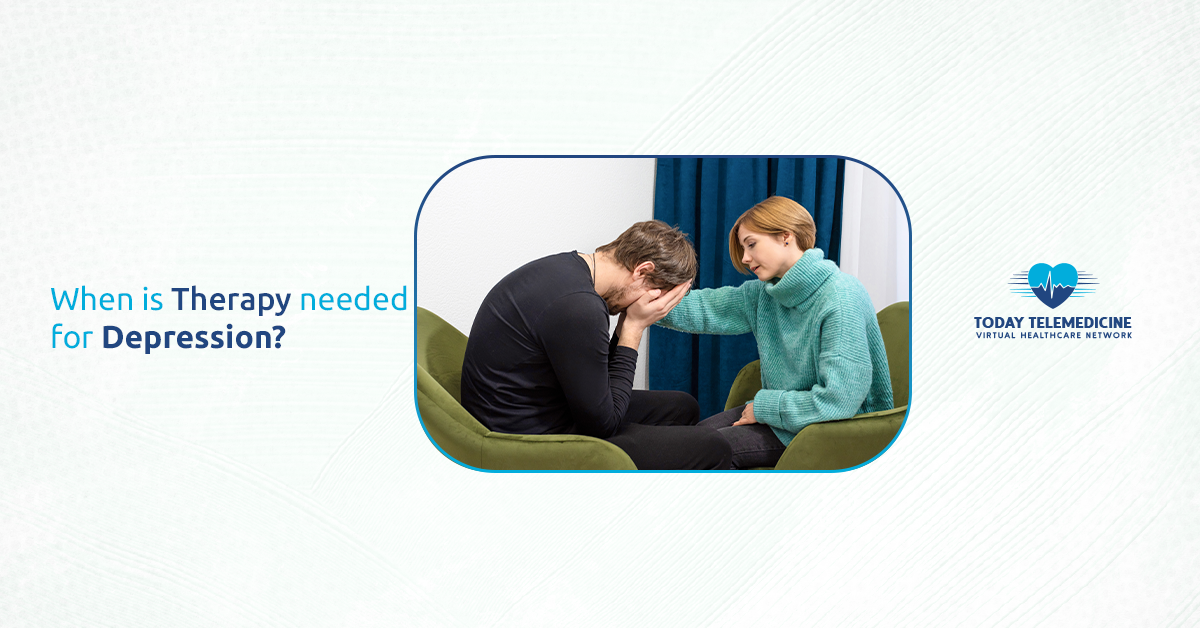Depression affects millions. In 2023, a survey found 29% of adults experience it. Currently, 18% are still affected. Women are more likely to face depression than men.
Similarly, younger adults are more affected than older ones. Despondency often initiates during late teenage years to mid-twenties. Mild sadness often goes away on its own.
But depression can persist. It can disrupt your daily life and cause serious health issues. But how do you know when is therapy needed for depression? Know the signs and seek help when needed.
Below we will explore the signs, symptoms, and situations that indicate therapy might be the right choice.
Are you facing depression and anxiety? Today Telemedicine is here to help. We offer treatments such as Cognitive-Behavioral Therapy (CBT) and more resources. The sessions you can make according to your own schedule. If you need any further details, please contact us.
What Is Depression?
Depression is a psychological condition. It leads to persistent despondency and grief. It also leads to a disinterest in once-enjoyed activities.
It can upset your emotions, thoughts, and actions. This can harm your mental and physical health. Common signs include:
- Persistent sadness or emptiness
- Fatigue or low energy
- Difficulty concentrating or making decisions
- Changes in appetite or sleep patterns
- Impressions of low self-esteem
- Ideas of self-injury or ending one’s life
Symptoms lasting over two weeks or disrupting daily life may require therapy. But how do you know you need therapy? Let’s explore further.
When Is Therapy Needed for Depression?
It’s tough to determine when to seek therapy, especially with mild symptoms. Here are situations where seek professional help might be necessary:
-
Persistent Symptoms
If depressive symptoms last more than two weeks, take action. Therapy can help when improvement seems distant.
Chronic issues can disrupt daily life, relationships, and work, even on good days. So, seek professional help and restore your happiness.
-
Interference with Daily Life
When depression starts affecting your work, study, or relationships, you should seek help. Correct counseling can bring back balance and function.
-
Unsuccessful Self-Help Attempts
Exercise, healthy eating, and journaling can help mild depression. However, they might not work for severe or chronic cases. A therapist offers the necessary support for recovery.
-
Physical Symptoms with No Medical Cause
Depression often causes physical pain, such as aches, fatigue, or indigestion. If a doctor finds no medical cause, a psychotherapist can address the emotional root.
-
Suicidal Thoughts or Behaviors
Seek professional help immediately if suicidal thoughts are present. Therapy, and possibly most time using medication, can be really helpful to save a life.
List 5 Reasons Why People Should Seek Therapy
-
Emotional Support
In a therapy session, you can talk about your feelings without the fear of being judged, and you will get some direction.
-
Improved Mental Health
Psychotherapy for despondency can help. It can reduce symptoms and enhance wellness.
-
Better Coping Mechanisms
Therapists teach strategies to manage stress, anxiety, and other emotional challenges.
-
Enhanced Relationships
Therapy helps improve communication and resolve conflicts in personal and professional relationships.
-
Prevent Escalation
Early intervention can prevent depression from worsening or leading to other mental health issues.
When Should You Get Help for Anxiety?
Anxiety often comes together with depression so learning to recognize the overlapping symptoms is critical. Seek help if:
- Anxiety consumes your thoughts every day
- You experience panic attacks or feel very tense often
- Physical symptoms such as headaches or muscle tension persist
Understanding when to seek mental help for anxiety can prevent it from intensifying alongside depression.
How to Know If You Need a Therapist?
Ask yourself these questions:
- Am I feeling stressed most of the time??
- Have I become apathetic towards things I used to love?
- Do I struggle to get out of bed or complete daily tasks?
- Have friends or family expressed concern about my well-being?
- Do I experience ongoing thoughts of futility or self-harm?
If you indicate “yes” to any of these, it’s time to seek guidance.
What About Going to Therapy for No Reason?
Counseling irrelative of a clear purpose can actually still be very effective. It’s a place to express your thoughts, understand yourself, and manage your emotions and stress.
Therapy is not just for problems. It can help you grow, improve your relationships, and care for your mental health.
Like exercise that keeps our body healthy, therapy is a preventive medicine for the mind, even if you’re okay. It is a good way to build a more satisfying and well-balanced life.
How Often Should You See a Therapist for Depression or Anxiety?
It depends on individual needs and symptom severity. That’s the frequency of therapist appointments for depression or anxiety.
In general, weekly sessions are highly beneficial at the beginning to build the progress and consistency. As the symptoms subside, sessions that would be twice a week or once a month could be the way to go for maintaining.
It is important to work with the therapist to establish the most suitable timing for the therapy. Regularly revisiting the plan helps ensure the approach is inline with your goals and progress.
If you’re questioning, your therapist helps you work out how often should you see a therapist for anxiety or depression.
Types of Therapy for Depression
There are various approaches to treating depression through therapy:
- Cognitive Behavioral Therapy (CBT)
- Interpersonal Therapy (IPT)
- Psychodynamic Therapy
- Group Therapy
Discuss with a professional to find the right fit for your needs.
When to Seek Mental Help: A Final Note
The decision to go through the therapy process is very personal. It takes clarity and courage to ask, “When is therapy needed for depression?”
If you struggle to manage your emotions or daily tasks, therapy could change your life.
Keep in mind that you don’t have to go through depression alone. Getting professional help is an option, and along with that, healing is a possibility.
FAQs
When should I see a therapist for anxiety?
Anxiety is a concern if it disrupts your interactions or work. If it happens, the person must seek proper care.
What is likely to happen in my first therapy visit??
In your initial session, the therapist in focus will execute the following:
- Inquire into your background, as well as the problems and the aims.
- Describe their method of treatment.
- Clarify the doubts you may have about the procedure.
- Start devising a treatment plan that is exactly what you require.





